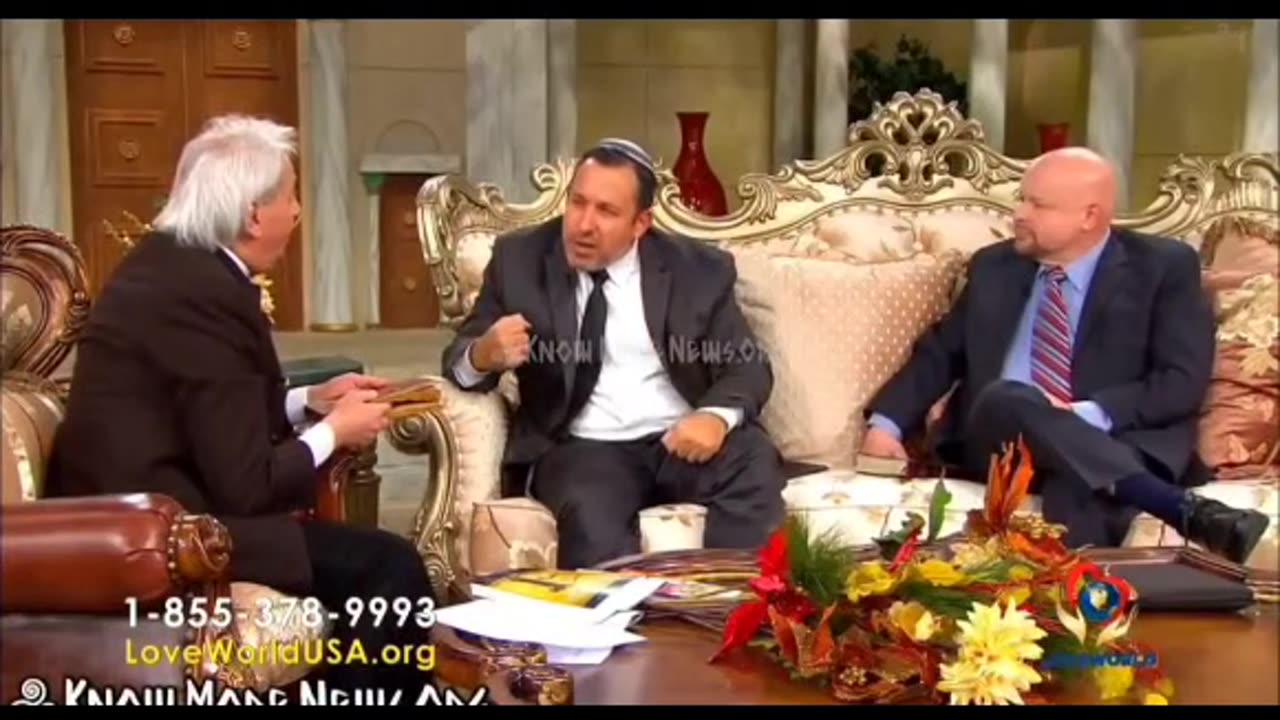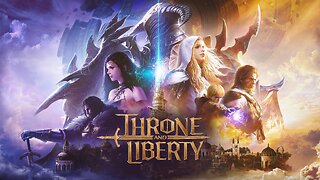Premium Only Content

Jews Fasting Christianity Censored and controlled by zionist Chews?
# The Secret Fast of the 9th of Tevet: Unveiling Hidden Histories
The 9th of Tevet, a fast day in the Jewish calendar, has long intrigued scholars and laypeople alike due to its mysterious origins and the secrecy surrounding its observance. Unlike other fasts with clear historical or religious significance, the 9th of Tevet's purpose has often been shrouded in silence. However, an alternative historical narrative suggests that this fast commemorates the death of Simon Peter, a figure of immense importance in Christianity. This essay delves into the fascinating tale of Shimon Kippa, explores the reasons behind the fast, and examines the broader implications for early Christianity and Judaism.
## The Identity of Shimon Kippa
### Shimon Kippa: Simon Peter
Shimon Kippa, known in Christian texts as Simon Peter, is recognized as one of Jesus's closest disciples. In the New Testament, he is depicted as a central figure in the establishment of the Christian Church. Jesus famously said to him, "And I tell you that you are Peter, and on this rock, I will build my church, and the gates of Hades will not overcome it" (Matthew 16:18, NIV). This verse underscores Peter's foundational role in Christianity, as he became the first bishop of Rome, commonly known as the Pope.
### Peter's Role in Christianity
Peter's significance extends beyond his leadership; he is also considered a martyr who was crucified upside down under Emperor Nero's reign. His legacy as a pillar of the Christian faith is cemented by his portrayal in the Gospels and the Acts of the Apostles. However, an intriguing Jewish narrative offers a different perspective on Peter's life and his relationship with Judaism.
## The Jewish Perspective: Toldos Yeshu
### An Alternative History
Toldos Yeshu, an anonymous medieval Jewish text, presents an alternative history of Jesus and early Christianity. This polemical work suggests that early Christian figures, including Peter, played roles far different from their traditional Christian portrayals. According to Toldos Yeshu, Shimon Kippa was a righteous man and a secret agent for Judaism.
### Claims about Peter
The narrative claims that Shimon Kippa, or Simon Peter, was strategically positioned to influence the nascent Christian movement. His mission was to create a religion that would appeal to Gentiles, thereby protecting Jews from conversion and persecution. This subversive role aimed to ensure that Christianity remained distinct from Judaism, thus safeguarding Jewish religious and cultural identity.
## The Purpose Behind the Fast
### Protection and Subversion
The secret behind the 9th of Tevet fast lies in commemorating the death of Shimon Kippa, who is seen as a protector of the Jewish people. By fostering the growth of Christianity, Peter's actions are interpreted as a means of diverting Gentiles away from Judaism. This strategic move is thought to have been essential in a time when Jews faced significant threats from both Roman authorities and emerging Christian sects.
### Early Christian-Jewish Dynamics
During the first century, the relationship between Jews and early Christians was complex and often contentious. According to the Acts of the Apostles, Peter was initially focused on preaching to Jews but later shifted his efforts towards Gentiles (Acts 10). This shift is seen by some Jewish scholars as a deliberate effort to distinguish Christianity from Judaism.
## Implications for Early Christianity and Judaism
### Essene and Nazarene Influence
The narrative surrounding Shimon Kippa suggests that early Christian leaders, including Peter and James, were influenced by Jewish mystical sects such as the Essenes and Nazarenes. These groups were known for their ascetic practices and apocalyptic beliefs, which may have shaped early Christian theology. The Dead Sea Scrolls, discovered in Qumran, provide insights into these sects' beliefs and practices, highlighting the interconnectedness of early Christian and Jewish thought.
### Language and Culture
One of the key strategies attributed to Shimon Kippa was the use of Greek and Latin in early Christian writings. By adopting these languages, early Christians could appeal to a broader audience while distancing themselves from Hebrew-speaking Jews. The New Testament's composition in Greek is a testament to this strategy. For example, the Gospel of Matthew, though addressed to a Jewish audience, was written in Greek to ensure wider dissemination.
## Controlled Opposition: A Controversial Theory
### Manipulation and Subversion
The notion of controlled opposition suggests that Jewish leaders intentionally manipulated early Christian movements to protect Jewish interests. This theory posits that by creating a religion with distinct laws and customs, Jewish leaders could ensure that Jews would not be tempted to convert. Paul's epistles, which advocate for the abandonment of Jewish law in favor of faith in Christ (Galatians 3:23-25), are often cited as evidence of this strategic distancing.
### Christian Laws and Customs
The divergence of Christian practices from Jewish traditions was crucial in establishing Christianity as a separate religion. The Council of Jerusalem, as described in Acts 15, decreed that Gentile converts to Christianity did not need to follow Jewish law, further solidifying this separation. This decision was instrumental in preventing the assimilation of Jewish customs into the burgeoning Christian faith.
## Scholarly Interpretations
### Controversy and Debate
The claims made in Toldos Yeshu and similar texts are highly controversial. While some scholars view these narratives as reflective of historical tensions between Jews and Christians, others dismiss them as polemical fabrications. The lack of corroborative historical evidence makes it challenging to substantiate these claims definitively. Nevertheless, they offer a fascinating lens through which to view the early interactions between Judaism and Christianity.
### Legacy and Influence
Regardless of their historical accuracy, these narratives have significantly influenced Jewish and Christian thought. They underscore the deep-seated anxieties and hostilities that marked the early centuries of the Common Era. By exploring these stories, we gain a deeper understanding of the complexities surrounding the development of these two major world religions.
## Modern Perspectives
### Historical Analysis
Modern historians continue to debate the validity of the claims made in Toldos Yeshu. Some argue that the text provides valuable insights into Jewish perceptions of early Christianity, while others see it as a product of medieval polemics. The text's portrayal of figures like Peter and Paul highlights the enduring nature of interreligious conflicts and the ways in which history is often shaped by competing narratives.
### Cultural Impact
The cultural impact of these narratives extends beyond academia. They resonate with broader themes of identity, resistance, and survival that are central to Jewish history. By framing early Christian figures as protectors or subverters, these stories reflect the ongoing struggle of Jewish communities to maintain their distinctiveness in the face of external pressures.
### Continuing Debate
The debate over the 9th of Tevet and the role of Shimon Kippa is likely to continue as scholars uncover new evidence and reinterpret existing texts. This ongoing dialogue enriches our understanding of the historical and theological dynamics that have shaped the relationship between Judaism and Christianity.
## Conclusion
The secret fast of the 9th of Tevet and the story of Shimon Kippa offer a captivating glimpse into the intertwined histories of Judaism and Christianity. While the historical accuracy of these narratives remains a subject of debate, their significance lies in their ability to illuminate the complex and often contentious interactions between these two faiths. By exploring these stories, we gain a deeper appreciation for the historical forces that have shaped the religious landscape of the Western world.
The account of Shimon Kippa as a protector of the Jewish people, the strategic creation of Christianity to safeguard Jewish identity, and the broader implications for early Christian-Jewish relations are all pivotal in understanding the multifaceted history of these religions. As we continue to examine these narratives, we not only uncover hidden histories but also enrich our collective understanding of the past and its enduring impact on the present.
---
### References
1. The Holy Bible, New International Version (NIV), Matthew 16:18.
2. The Acts of the Apostles, New Testament.
3. Toldos Yeshu, Medieval Jewish Text.
4. The Dead Sea Scrolls, Qumran Manuscripts.
5. Galatians 3:23-25, The Epistles of Paul.
6. The Council of Jerusalem, Acts 15.
7. Various scholarly articles and historical analyses on the early Christian-Jewish relationship.
This comprehensive essay aims to provide an in-depth look at the secret fast of the 9th of Tevet and the intriguing narrative of Shimon Kippa, drawing on scriptural references and historical texts to offer a nuanced understanding of this fascinating topic.
-
 LIVE
LIVE
Boxin
49 minutes ago(Rumble push to 50 Followers!) (alerts Working...?) Spoopy Month!!!! Resident Evil 7 Biohazard 4
1,055 watching -
 LIVE
LIVE
Father Russell
1 hour agoThrone and Liberty | Morning Stream
474 watching -
 LIVE
LIVE
ColdHe4rted
5 hours agoOverwatch = new tank! Lets go!
550 watching -
 5:19:50
5:19:50
SLS - Street League Skateboarding
8 days ago2024 SLS Tokyo: Women’s and Men’s Knockout Rounds
524K23 -
 2:51:00
2:51:00
Fresh and Fit
9 hours agoWomen Claim To Give Better Dating Advice So We Did THIS...
144K77 -
![[F EM UP Friday] Take # 2 [Destiny 2] Lets Kick Some A$$! #RumbleTakeOver](https://1a-1791.com/video/s8/1/c/W/7/1/cW71u.0kob-small-F-EM-UP-Friday-Take-2-Desti.jpg) 5:16:50
5:16:50
CHiLi XDD
10 hours ago[F EM UP Friday] Take # 2 [Destiny 2] Lets Kick Some A$$! #RumbleTakeOver
47K1 -
 5:13:43
5:13:43
ItsMossy
16 hours agoHALO WITH THE RUMBLERS (: #RUMBLETAKEOVER
44.5K1 -
 1:54:08
1:54:08
INFILTRATION85
9 hours agoHi, I'm INFILTRATION
39.7K9 -
 7:51:03
7:51:03
GuardianRUBY
11 hours agoRumble Takeover! The Rumblings are strong
94.3K5 -
 4:28:45
4:28:45
Etheraeon
18 hours agoWorld of Warcraft: Classic | Fresh Level 1 Druid | 500 Follower Goal
63.4K1